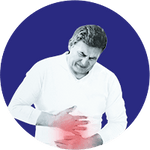
Good Night! Sweet Dreams!
How often have you heard this common utterance and probably said it to others? Dig deeper and realize for yourself the benefits of sleep, the significance and the medical relevance of this wish and a good night sleep. A weary and tired body is aching for rest, and sleep provides just that.
What is Sleep?
When one is awake, the eyes blink automatically and routinely. However, when one is asleep, all voluntary movements or sensory activities get inhibited, and the body adjusts itself to a new rhythm called Rapid Eye Movement (REM), where the body goes into a state of virtual paralysis. It is in this state, called the anabolic state, where the tissues that have been damaged during the course of a day's activity get repaired, and so it is rejuvenation time!!!
What are the Stages of Sleep?
Sleeping normally follows a pattern and different stages of sleep. Stage 1 is normally when you toss and turn, followed by Stage 2 when drowsiness creeps in and one gets disengaged with the body. Stage 3 is when sleep conquers, and the restorative process sets in, charting a different path for the body, now in complete rest, transporting it to the world of dreams.
How Much Deep Sleep is Required?
This is age and medical condition-related and hence varies.
1. For youngsters, 8-9 hours of sleep seems to be the accepted norm.2. For elders, some 7-8 hours are considered adequate.
3. For diabetics, less than 4-6 hours of sleep for a continuous period of a week or so can cause aggravation.
How Does Sleep Benefit?
The anabolic benefits of good sleep are very important for tissues to repair. Good sleep lowers heart risk, is helpful for diabetics, releases hormones, improves appetite, enhances productivity and augments the power of concentration.
What Causes Lack of Sleep?
Sleep deprivation conversely leads to lethargy, depression, damage through inflammation of the digestive system and obesity, as it results in increased appetite. Studies reveal that 90% of children and 50% of adults become obese when good sleep is lost. Conditions such as sleep apnoea, where one tends to wake up gasping for breath, can acquire serious dimensions warranting medical intervention.
1. Go to sleep by avoiding alcohol. It only has a sedative quality which is not sleeping.
2. Avoid caffeine as it is a stimulant and works against sleep.
3. Avoid the use of electronics, especially the television, which should be switched off for at least an hour before turning it in.
Healthy Sleep Tips
1. De-stress.
2. Try a warm water bath.
3. Get a soft blue light going in the room and RELAX.
Sleep deprivation causes various forms of insomnia, such as behavioural insomnia manifesting as a problem from childhood or idiopathic insomnia, which describes itself as a mental disorder. But the upshot is that these conditions crave attention. Do not ignore them.
The article is based on the information available in public and which the author believes to be true. The author is not disseminating any information which the author believes or knows is confidential or in conflict with the privacy of any person. The views expressed or information supplied through this article is mere opinion and observation of the author. The author does not intend to defame, insult or cause loss or damage to anyone, in any manner, through this article.































